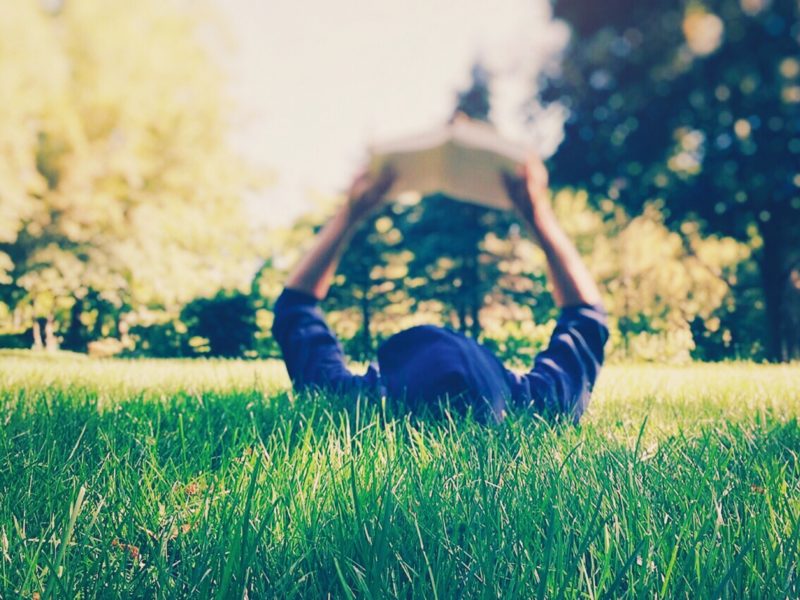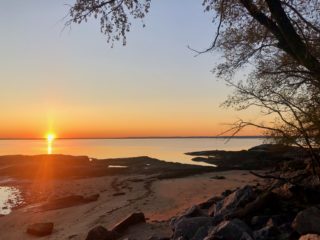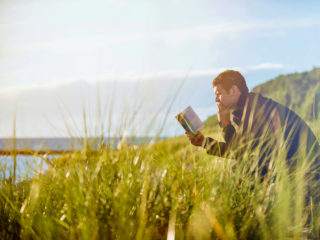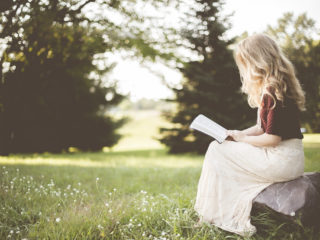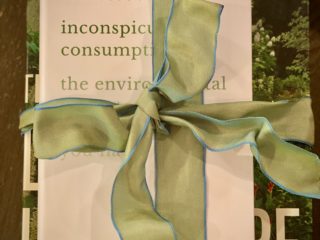What better way to enjoy the summer than getting lost in a good book? Green That Life’s Eco Friendly Summer Reading Guide has book suggestions for every reader, so find a comfortable spot (outside) and start reading!
Your Eco Friendly Summer Reading Guide
Table of Contents
- Your Eco Friendly Summer Reading Guide
- The Latest Must-Read Book on Climate
- Enthralling Green Fiction
- A Gorgeous Garden Design Book That’s Also Sustainable
- A Restorative Gardening Book
- A Wilderness Book to Get Lost In
- Learn Something New
- A Book That Informs and Inspires
- A Book That Offers Hope
- A New Book for Foodies
- A Green Summer Book for Young Readers
The Latest Must-Read Book on Climate
The New Climate War: The Fight to Take Back Our Planet, by Michael Mann

In the fight to take back our planet, Mann points his guns at the fossil fuel industry — assigning most of the blame on our current climate predicament on Big Oil’s concerted and heavily funded campaign to deceive and deflect responsibility. Armed with the facts, Mann provides a path forward to combat systemic and institutionalized resistance to climate action.
Science educator Bill Nye writes that Mann shows how “corporations and lobbyists have been successful in convincing us that climate change will be fine, if we just recycle our bottles and turn out the lights … He’s optimistic though because he sees what we really can and will do. Read his book, and let’s get to work.”
Enthralling Green Fiction
Prodigal Summer, by Barbara Kingsolver

Publishers Weekly raves that readers will “respond to the sympathy with which she reflects the difficult lives of people struggling on the hard edge of poverty while tied intimately to the natural world and engaged an elemental search for dignity and human connection.” As usual, Kingsolver’s prose is elegant and aware, and Prodigal Summer is a nod to how the environment works its way into all of our persona lives.
A Gorgeous Garden Design Book That’s Also Sustainable
Planting in a Post-Wild World: Designing Plant Communities for Resilient Landscape, by Thomas Rainer and Claudia West

Rainer and West identify problems with what they call our “post-wild world;” one that’s represented by urban sprawls, the taming of nature for the sake of aesthetics, and mass suburbanization, which results in a lack of proper biodiversity. The authors present their idea of designed plant communities where the goal is to combine realistic plant choices with a layout that fosters natural growth.
Larry Weaner, founder of New Directions in the American Landscape, writes that Planting in a Post-Wild World is “A real-world guide for creating beautiful, ecologically connected landscapes. There is not a designer or property owner that would not benefit from this approach.”
A Restorative Gardening Book
The Well-Gardened Mind: The Restorative Power of Nature by Sue Stuart-Smith

PD Smith at The Guardian writes that The Well-Gardened Mind “is a life-affirming study of the special pleasures of tending your garden and growing things.” Stuart-Smith’s stories are heartfelt and her suggestions are valuable, all with the intent of bringing peace to your life and garden.
A Wilderness Book to Get Lost In
Desert Solitaire, by Edward Abbey

Originally published in 1968, Edward Abbey’s memoir is an impassioned call for the appreciation of nature amidst the manufactured, rapidly developing world of today. The book recounts Abbey’s time as an Arches National Park Ranger near Moab, Utah, and it is just as filled with entertaining anecdotes and personal moments as it is filled with arguments for wildlife and nature conservation.
In a special 50-year anniversary review, Douglas Brinkley at The New York Times writes that Abbey’s storytelling “is a perfectly rendered hybrid of transcendental joy, coyote humor, in-your-face wrath, field science detail, philosophical righteousness, and moral clarity.” Desert Solitaire is a true classic and remains as potent and beautiful today as it was years ago.
Learn Something New
Sustainability Made Simple: Small Changes for Big Impact, by Rosaly Byrd and Lauren DeMates

Carol Haggas at Booklist writes of the authors: “Byrd and DeMates take a comprehensive yet straightforward approach as they debunk and demystify misconceptions surrounding sustainability. Looking at such regular activities as grocery shopping, household cleaning, gardening, and traveling, the authors offer practical advice regarding small but essential changes that can be easily adopted.”
Sustainability Made Simple’s approach to the climate crisis is practical yet hopeful. It’s an excellent introduction to easy changes we can all make in our lives.
A Book That Informs and Inspires
Let My People Go Surfing: The Education of a Reluctant Businessman, by Yvon Chouinard

The 10th-anniversary edition includes a new foreword from acclaimed climate author Naomi Klein, who writes, “This is the story of an attempt to do more than change a single corporation—it is an attempt to challenge the culture of consumption that is at the heart of the global ecological crisis.”
Greg Ambrose at the San Francisco Chronicle writes, “For everyone who is alternately outraged and depressed by the wave of greed that has been the hallmark of corporate America in the twenty-first century, there is a name that inspires hope: Yvon Chouinard.” Let My People Go Surfing is a powerful account of one man’s crusade to transform our corporate culture of consumption.
A Book That Offers Hope
Hope Matters: Why Changing the Way We Think Is Critical to Solving the Environmental Crisis, by Elin Kelsey

Kelsey, a Ph.D., and award-winning author uses evidence-based examples to demonstrate how hope, not fear, is the most effective and enduring tool in combatting climate change. Hope Matters is filled with accounts of successful environmental campaigns for rewilding, ocean conservation, and habitat resilience, while offering ways for individuals to take action.
In recommending Hope Matters, Jane Goodall writes “This book comes at just the right moment. It is NOT too late if we get together and take action, NOW.”
A New Book for Foodies
#EATMEATLESS: Good for Animals, the Earth & All, by Jane Goodall

Part cookbook, part rallying call to join the Jane Goodall Institute’s new campaign of the same name, #EATMEATLESS provides delicious and easy ways to go meatless with its 80 plant-based recipes. With a foreword by Dr. Goodall herself, #EATMEATLESS is filled with beautiful photos and Goodall’s inspirational quotes that prove how going plant-based doesn’t have to be “a complete upheaval in order for it to be completely revolutionary for people, other animals, and the planet we share.”
A Green Summer Book for Young Readers
The Last Wild, by Piers Torday

Author Piers Torday explains that while his goal for The Last Wild is to “draw attention to some of the considerable environmental challenges facing not just us, but the next generation,” he is fundamentally an optimist and believes that “humans are inspired to achieve their best through stories, not through statistics.”
Informative and timely, The Last Wild is also a great read to add to your eco friendly summer reading list: Publishers Weekly writes: “Torday’s story is alternately somber, thrilling, and silly, filled with eccentric human and animal characters with distinctive voices.”

